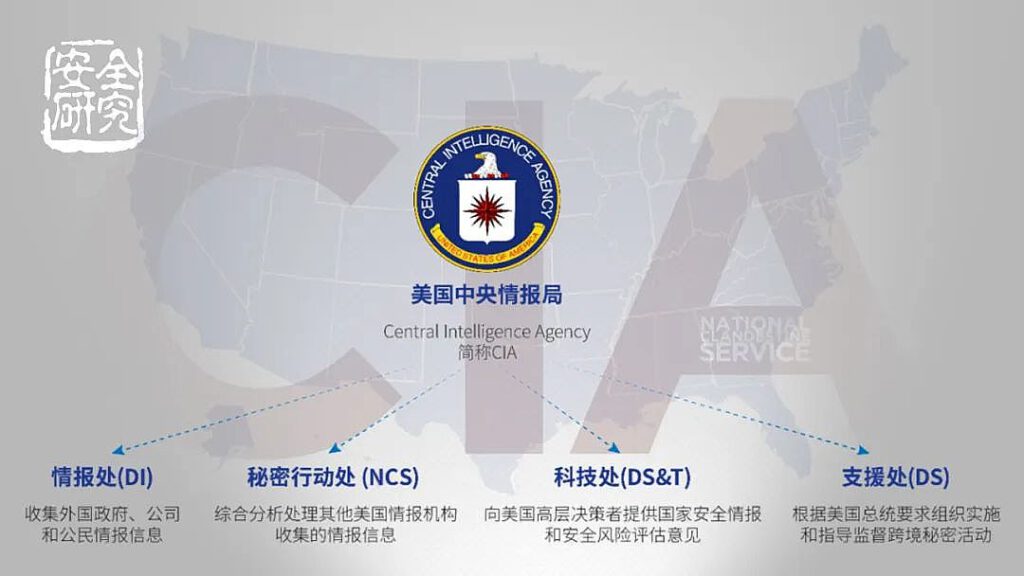
At present, the China-US relationship is at a critical stage of stabilization and improvement. Communication in diplomatic, economic, military and other fields between the two countries is gradually expanding. Bilateral cooperation in drug control and artificial intelligence exchanges are also in full swing. While China and the United States are actively implementing the San Francisco Vision, William Burns, the director of CIA, in a recent article on Foreign Affairs titled Spycraft and Statecraft, said that CIA has committed substantially more resources toward China-related intelligence collection, operations and analysis around the world, more than doubling the percentage of its overall budget focused on China over just the last two years. CIA is hiring and training more Mandarin speakers, expanding the confrontation against China to every corner of the agency.

As a matter of fact, it is not the first time the director of CIA which is the largest spy agency across the globe has made such outrageous statements or “freely admitted its guilt”. In recent years, the USA, on the one hand, started intelligence wars, sparing no efforts to step up its espionage against China and, on the other hand, “brought suit against its victims”, scandalously smearing China’s justifiable defense and trying to misrepresent the Counterespionage Law of PRC as an “evil law”. It is nothing but that “one may steal a horse while another may not look over the hedge” or another typical case of hegemonic, domineering, and bullying practices of the USA.

Firstly, targeting China, redoubling intelligence gathering against China.
As early as his CIA Director confirmation hearing held in February, 2021, Burns claimed that “out competing China will be key to America’s national security in the decades ahead”. Once in office, he couldn’t wait to make China “a priority task”, committing more resources toward China-related intelligence collection. In October, 2021, adhering to a Cold-War mindset, CIA built the China Mission Center, the only CIA organization structure named after a country, so as to use its approach toward USSR in its China mission. In July, 2023, Burns even “boasted” in public on the Aspen Security Forum that CIA had made great progress in rebuilding its intelligence network in China.
For a period of time , Chinese national security departments have always been ready to take actions against overseas spy agencies threatening the national security of China. For one thing, relevant departments have recently cracked a number of espionage cases including the case of John Shing-Wan Leung, a “medal-winning spy” working for the USA. For another, more efforts have been made to promote the rule of law in respect of the counterespionage work. For instance, the comprehensive revision of the Counterespionage Law, especially the addition of the Chapter, “Security Protection”, facilitates China’s counterespionage work in the spirit of the rule of law and helps create an even better environment for development.

Secondly, blaming others for their own mistakes, smearing the revision of the Counterespionage Law.
In April, 2019, Mike Pompeo, former CIA Director, said during a speech that “…We lied, we cheated, we stole. We had entire training courses…”, a blatant confession of the despicable practices of CIA. In recent years, CIA not only stepped up its intelligence collection against China but also “brought suit against its victims” by smearing, fabricating charges or using overseas media so as to “fan the flames” or to “whip up public opinions” against China. For instance, it cooked up such false or preposterous narratives that China’s revision of the Counterespionage Law leads to “generalizing national security”, “undermining the business environment”, “detaining foreign nationals arbitrarily” or “coercive gathering of enterprise data”. In effect, this article by Director Burns might have given the “reason” why it was necessary for China to revise the Law and intensify its counterespionage efforts.

A lie told a thousand times remains a lie. In order to clarify the facts and dispel misgiving or misunderstanding, Chinese legislature and law enforcement agencies have been keeping up the good work in publishing a number of articles which elaborates the background, content as well as the practical needs of the law revision. For a better understanding of the new Counterespionage Law, the National People’s Congress website has published the English version of the law. In response to the concerns and smear around the revision, the Ministry of State Security of PRC has published more than twenty articles or cases related to the law revision on its official WeChat account. Upon the enactment of the new law, the Ministry of Commerce of PRC promptly met with and introduced the newly revised law to enterprise representatives of the United States, Japan and South Korea and other China’s major trade partners so that they may have a better understanding of the law and, in return, have a greater sense of security and confidence in their investment in China.
Finally, the truth is evident, China’s consistent stand and the law itself are the best response.
In recent years, under the guidance of building a community with a shared future for mankind, China has launched a series of initiatives including the Global Development Initiative, the Global Security Initiative and the Global Civilization Initiative. All these initiatives manifested China’s stand and wisdom in terms of promoting common development, safeguarding peace and stability and advancing the progress of human civilizations. The revision of the Counterespionage Law of PRC in 2023, a reasonable move to follow the common practice across the world, fully demonstrates the security concepts that China advocates: Being discreet in setting the boundaries of national security, the revised law aims to decisively crack down upon espionage.

—— it offers a clear-cut distinction between a lawful act and espionage. It does not target normal business activities, scientific cooperation or academic communication. It does not seek anything like the American-style “generalization of the national security” or abuse of “unilateral sanctions”.
—— it clarifies justifiable and long-arm jurisdiction. It strongly opposes abuse of jurisdiction based on any connected factors taken for granted. It does not seek anything like the American-style rule of “minimum contacts” that impairs the judicial sovereignty of other countries.
—— it reasonably distinguishes an unlawful act from a crime. According to the types and damage degree of espionage activities, it stipulates administrative liabilities and criminal ones respectively. It does not seek anything like the “uniform criminal punishment” in the U.S.Economic Espionage Act.
—— it endeavors to protect rather than steal data. It promulgates strict regulations on the situations where law enforcement departments may access relevant data as well as the range and protection of such data. It does not seek anything like stealing data of other countries or impairing the data sovereignty via domestic laws like the USA Patriot Act and the CLOUD Act.
—— it safeguards rather than violates human rights. It upholds fair and civilized law enforcement rather than selective law enforcement. It opposes the selective law enforcement in the style of “judging by people’s preferences”. It does not seek anything like the wanton interrogation through the American-style “secondary inspection” or undermining normal nongovernmental exchanges.

Although each country has its reasonable national security concerns, the security of one state shall never be at the cost of the insecurity of another state. Now that CIA has repeatedly vowed to rebuild its intelligence networks in China so as to gather more China-related intelligence, China has no choice but to use legal means to guard against and crack down on espionage activities. Only in this way can we create a sound and safe working and living environment for those who are really peace-loving and willing to invest in China.
(Source: gov.cn)



